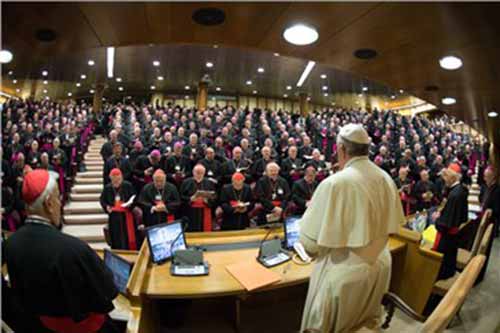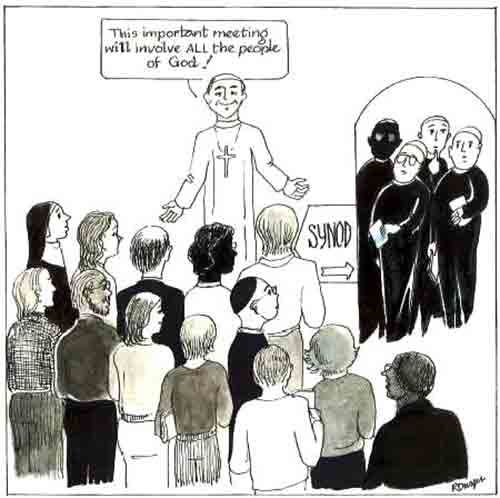Many will be praying for and following the third Extraordinary General Assembly of the Synod of Bishops meeting in the Vatican at the moment (5 to 19 October) on the topic: The Pastoral Challenges of the Family in the Context of Evangelization. This is in preparation for the 14th Ordinary General Assembly of the Synod of Bishops in October 2015, on the same topic.
A lot of expectation is around allowing remarried divorcees to receive Holy Communion. Traditional Roman Catholic logic runs something like this:
- a valid, sacramental marriage is indisoluble – it is for life.
- if you are validly married, and have sex with someone else, that is adultery
- adultery is a grave sin
- those in the state of grave sin cannot receive Holy Communion
A somewhat different approach is followed by Cardinal Walter Kasper
Cardinal Walter does not understand the second union (a civil marriage after divorce) as a sacramental marriage, but he says it possesses some of the “essential elements of marriage and of a family: there is love, there is commitment, there is exclusivity, there is forever, there is prayer life, there are children, they’re well-educated in Christian life. Many things are there and especially there is a public dimension.”
Matthew 19:9 is used as a proof text on both sides of the debate. The normal Roman Catholic understanding of the text is:
I say to you, whoever divorces his wife (unless the marriage is unlawful) and marries another commits adultery.
Ignatius Catholic Study Bible comments
…Several Church Fathers suggest Jesus allowed for divorce in cases of serious sexual sin such as adultery, but he never permitted remarriage after divorce. The spouses may separate in these circumstances by a legal arrangement of living apart, but they cannot break the marriage bond, and they are not free to remarry. This view finds support by a consideration of the Greek word porneia, translated “unchastity”, in Mt 19:9. While the word has a broad range of meaning, it can mean “adultery”, as in the Greek OT (also translated “harlotry”; Sir 23:23; Ezek 16:33; Hos 2:2). Thus, an adulterous situation may give cause for separation so long as the spouses do not embark upon a second marriage. This squares with St. Paul’s teaching that a separated couple has only two options: be reconciled to one another, or remain single (1 Cor 7:10-11).
…(A second) position interprets “unchastity” in Mt 19:9 as invalid marriages where the spouses are too closely related. Thus, “except for unchastity” (Mt 19:9) means “except where unlawful unions exist”. Such unions ought to be severed because of the impediment posed by near blood-relations. A divorce under these conditions does not sunder a true marriage bond because a valid marriage never existed. It is equivalent to an annulment.…
…According to (yet another) position, Jesus sets aside Jewish debates over the grounds for divorce in the Old Covenant (Deut 24). Because Jesus is revoking the OT concession on divorce, he brackets the whole issue and sets it off to the side as irrelevant. Thus, “except for unchastity” (Mt 19:9) means “regardless of the OT grounds for divorce”. Jesus refuses even to comment on Deut 24:1. To do so would blunt the force of his own teaching, since he is not clarifying or reaffirming Moses’ permission, he is abolishing it.…
Anglicans were in a position not dissimilar to Roman Catholics currently. And some Anglican Churches still are. This has a church process of some form to allow a new marriage in some cases.
For Roman Catholics, this follows the annulment of the previous marriage, a costly and time-consuming process that declares the first marriage to have not existed, to not have been valid. Pope Francis has already set up a committee to examine the possibility of simplifying the procedure. He is very aware that on some Vatican rulings on sexual ethics generally ordinary Roman Catholics now assume ignoring the rule is the norm. Humanae Vitae, against using artificial contraception, would be the most obvious example.
Many Anglican Churches have moved on, following an approach not dissimilar to Cardinal Walter’s, or further. And many are now following this trajectory, although Cardinal Walter attempts to deny the consequence of his thinking (I think his denial is weak), and are seeing God’s marriage-type love evidenced in committed same-sex couples.
An obvious drawback of the Vatican process is that discussion is primarily amongst older, intending-to-be-celibate males.
You can draw your own parallels between that and the debate about committed same-sex couples.
Update 8 October: here is Peter Carrell’s blog post on the topic with a link to the NZ RC Bishops Pastoral Letter on the Responses to the Preparatory Document for the Extraordinary Assembly of the Synod of Bishops
More detailed information can be found here.
first image source – includes list of participants.
second image source with the message from Catholic Church Reform International to the synod.





Off topic, but speaking of marriages, have you heard the news in the USA? The US Supreme Court this morning denied to hear the appeals from the three US Appeals Courts upholding lower federal court rulings that struck down the bans of same gender marriages in 5 US states. That means that marriages will soon resume or begin in the five states involved in those appeals and also in the six further states with bans in those three appeals court jurisdictions. That will bring marriage equality to 30 US states likely by the end of this year.
There is still a federal appeals court that has yet to hear federal district court decisions on same gender marriage, the 5th US Circuit in New Orleans LA. One case from LA upheld a same gender ban and the other, a case from TX, knocked down the TX ban. But I would think the justices of the 5th Circuit would see the writing on the wall with the supreme court’s decision today to deny certiori and allow marriages to begin/resume in the other states and not want to see their decision overturned on appeal.
And after possibly 100s of 100s of same gender marriages, I can’t see the US Supreme Court turning back the clock and declaring those marriages null & void, or allow them to stand, but forbidding any further to take place.
I don’t believe marriage was the same thing at all in Biblical times as it is today, it’s all about male ownership of women for one thing. I’ve always interpreted the sermon on the mount as Jesus trying to teach kindness, as in husbands don’t abandon your wives.
Interesting isn’t it Bro David, the US is one crazy mixed-up country sometimes. When you look at the general lewdness of the society, the cynicism, taking advantage of the sick, false advertising, the huge US pornography industry…I know men who go to church and to topless bars and see no inconsistency in their actions- it sometimes seems due to technology that we are way different, way more sophisticated than the people Jesus addressed in Galilee 2000 years ago, but we’re not that different really.
SO it’s a rather stupid idea to decide to make a religious argument against one perceived ‘sin’ whilst supporting or ignoring all the others.
I don’t particularly care myself what consenting adults choose to do in their private lives, so long as they don’t expect their public activities to deliberately shock or offend people. I certainly don’t intend to be treated like the possession of a man to comply with earlier religious ideas.
But I am often confused at the issues churches pick up, and the ones they leave unpacked.
Freedom is supposed to be of paramount importance to us Americans though, and I don’t see anywhere that’s not a free country that would be a good place to live, and that’s half the world I suppose.
I just wish more Americans would get that freedom is freedom, for all, not ‘my freedom is more important than yours’.
That’s hypocrisy.
Hi Bosco
(‘Casper’ should be ‘Kasper’)
Alongside ‘marriage-lite’ I suggest a need to talk about ‘truth-lite’ (in respect of whether marriages can be annulled in the way Romans say they can … hasn’t a process to sort out unfortunate mistakes in marriage (“Help, I have married within the degrees of sanguinity!”) now stretched to find any and every possible way to annul a marriage rather than consider that, actually, a genuine marriage has been dissolved?), ‘mercy-lite’ (in respect of whether failure in marriage deserves ongoing refusal to participate in communion), and ‘sin-lite’ (in respect of all the Catholics currently receiving communion thinking they are married but when their marriage breaks down and they receive an annulment, doesn’t that mean that they were living in sin for all those years they thought they were married?)
I think these are important points, Peter (and thanks – I fixed the typo). I would add the question: how do Roman Catholics know they are really married? When RCs go through difficult times in their marriage, do some of them ask themselves, “am I really married?” Blessings.
Great question!
>>Traditional Roman Catholic logic runs something like this:
…
>>those in the state of grave sin cannot receive Holy Communion
Not quite, they would need to be in a state of mortal sin, which requires full knowledge of the sinfulness done and complete consent. Merely grave sin would be insufficient.
God bless
As I said, and you stress, Chris: “something like this”. I am, hence, not sure of what your point changes: are you suggesting that adultery is not mortal sin in current RC classification? Or that the synod and/or pope may alter its classification? Blessings.
Chris,
That is not correct. The current RCC canon law speaks of grave sin, not mortal sin (i.e. in Canon 915, which is what is currently being applied to remarried people).
Thanks, Scott. It is nice to find that my “something like” is actually exactly like 🙂 Blessings.